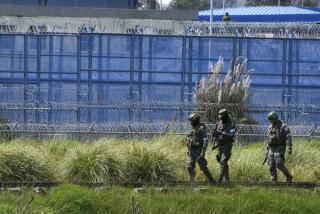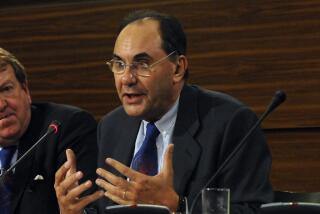Car Bomb in Madrid Kills High Court Judge, 2 Others
- Share via
LONDON — A remote-control car bomb exploded in central Madrid during morning rush hour Monday, killing a military judge on the Supreme Court, his driver and police bodyguard in the bloodiest attack this year attributed to the Basque separatist group ETA.
An additional 66 people were treated for injuries from the blast, which set fire to a passing city bus, ripped apart automobiles and blew out windows in dozens of apartment buildings in the affluent Arturo Soria area of northeastern Madrid.
The killings are believed to be part of a widening campaign of assassinations by the Basque Homeland and Freedom movement, known by its Spanish initials ETA, which has been linked to the killings of 16 other people since ending its 14-month cease-fire nearly a year ago.
The ETA has targeted politicians, military officers, journalists and businesspeople across the country in an effort to broaden its war for independence beyond the Basque region. This month alone, suspected ETA cells also killed a prosecutor at his home in Granada, a military doctor at his offices in Seville and a prison officer in the Basque region.
The Monday explosion, which occurred near one of Madrid’s busiest intersections as children arrived at a school a block away, was the most dramatic attack in the escalating violence.
It may have been timed to coincide with the sentencing of one of the ETA’s top leaders in connection with the murder of a national prosecutor, Carmen Tagle, in 1989.
A few hours after the blast, Francisco Mugica, known as “Pakito,” was given 30 years in prison for ordering and facilitating Tagle’s murder. At his trial this month, Mugica told the judges they were part of the Spanish domination of Basque country and “for that reason, for us, you are all Carmen Tagle.”
The ETA has been fighting for Basque independence from Spain and France for decades, claiming more than 850 victims along the way. The group announced a cease-fire in September 1998 and held talks with the government of Spanish Prime Minister Jose Maria Aznar the following year. But Aznar refused to discuss complete independence for the region, which already collects its own taxes, teaches in the Basque language in public schools and has its own police force.
The ETA declared an end to the cease-fire in December and renewed its attacks in January with a car bombing in Madrid that killed an army colonel.
French and Spanish police have rounded up dozens of ETA political activists and suspected military leaders, including the alleged top leader, Ignacio Gracia Arregui, in the last two months but have not hampered the group’s ability to strike.
The ETA usually waits weeks before claiming responsibility for its attacks, but officials said they had no doubt who was behind Monday’s blast.
The judge killed in the explosion was Jose Francisco Querol, 69, one of 84 magistrates on the country’s Supreme Court. Querol, who held the rank of general and oversaw military hearings at the Supreme Court, was a close friend of Defense Minister Federico Trillo.
“All of us should feel as if we are victims of ETA,” Trillo said after the bombing. “We should all have exactly the opposite reaction of what they intend: We should support the rule of law, support the action of the security forces and, with the backing of the government and democratic political forces, put an end to this band of assassins.”
Querol, who was to retire on his 70th birthday next month, was on his way to work when the bomb, containing an estimated 65 pounds of dynamite stashed in a parked car, was detonated by remote control at 9:15 a.m., Madrid police said.
The street exploded in flames and black smoke. Querol, his driver and his bodyguard burned to death in their car. A city bus turning into the intersection caught fire. Bloodied pedestrians screamed in fear, and panic spread as parents rushed to collect their children from school. Frightened residents poured out of singed apartment buildings.
The bus driver, an 11-year-old girl and her father were among six people who suffered serious injuries. Scores of others were treated for cuts and bruises in hospitals and at a field tent set up at the scene.
King Juan Carlos I condemned the attack. Madrid Mayor Jose Maria Alvarez del Manzano said: “They will never break a whole nation. They will cause pain, but they will not advance and will not achieve anything.”
More to Read
Sign up for Essential California
The most important California stories and recommendations in your inbox every morning.
You may occasionally receive promotional content from the Los Angeles Times.













